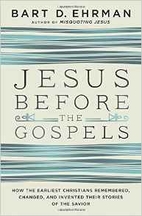I leave the following quotations from Bart Ehrman for readers to peruse and draw their own conclusions on what they indicate about pots, kettles and scholarly professionalism. My own bolded emphasis, I admit, is designed to lead you.
In Did Jesus Exist? (2013) Bart Ehrman on the reliability of the evidence of Papias . . . .
. . . The great church historian of the fourth century, Eusebius, dismissed Papias by saying that he was “a man of very small intelligence” (Church History 3.39).
Intelligent or not, Papias is an important source for establishing the historical existence of Jesus. He had read some Gospels although there is no reason to think that he knew the ones that made it into the New Testament, as I will show in a moment. But more important, he had other access to the sayings of Jesus. He was personally acquainted with people who had known either the apostles themselves or their companions. The following quotation of his work, from Eusebius, makes the point emphatically:
I also will not hesitate to draw up for you, along with these expositions, an orderly account of all the things I carefully learned and have carefully recalled from the elders; for I have certified their truth…. Whenever someone arrived who had been a companion of one of the elders, I would carefully inquire after their words, what Andrew or Peter had said, or what Philip or what Thomas had said, or James or John or Matthew or any of the other disciples of the Lord, and what things Aristion and the elder John, disciples of the Lord, were saying. For I did not suppose that what came out of books would benefit me as much as that which came from a living and abiding voice.2
Eusebius summarizes what Papias claimed about his sources of knowledge about Jesus, a passage worth citing at length:
This Papias, whom we have just been discussing, acknowledges that he received the words of the apostles from those who had been their followers, and he indicates that he himself had listened to Aristion and the elder John. And so he often recalls them by name, and in his books he sets forth the traditions that they passed along. These remarks should also be of some use to us….
And he sets forth other matters that came to him from the unwritten tradition, including some bizarre parables of the Savior, his teachings, and several other more legendary accounts….
And in his own book he passes along other accounts of the sayings of the Lord from Aristion, whom we have already mentioned, as well as traditions from the elder John. We have referred knowledgeable readers to these and now feel constrained to add to these reports already quoted from him a tradition that he gives about Mark, who wrote the Gospel. These are his words:
And this is what the elder used to say,
“When Mark was the interpreter [or translator] of Peter, he wrote down accurately everything that he recalled of the Lord’s words and deeds—but not in order. For he neither heard the Lord nor accompanied him; but later, as I indicated, he accompanied Peter, who used to adapt his teachings for the needs at hand, not arranging, as it were, an orderly composition of the Lord’s sayings. And so Mark did nothing wrong by writing some of the matters as he remembered them. For he was intent on just one purpose: to leave out nothing that he heard or to include any falsehood among them.”
So that is what Papias says about Mark. And this is what he says about Matthew:
“And so Matthew composed the sayings in the Hebrew tongue, and each one interpreted [or translated] them to the best of his ability.”
And he set forth another account about a woman who was falsely accused of many sins before the Lord,3 which is also found in the Gospel according to the Hebrews…. [Eusebius, Church History 3.39]
This is such a valuable report because Eusebius is quoting, and then commenting on, the actual words of Papias. Papias explicitly states that he had access to people who knew the apostles of Jesus or at least the companions of the apostles (the “elders”: it is hard to know from his statement if he is calling the companions of the apostles the elders or if the elders were those who knew the companions. Eusebius thinks it is the first option). When these people would come to his city of Hierapolis in Asia Minor, Papias, as leader of the church, would interview them about what they knew about Jesus and his apostles. Many conservative Christian scholars use this statement to prove that what Papias says is historically accurate (especially about Mark and Matthew), but that is going beyond what the evidence gives us.4 Still, on one point there can be no doubt. Papias may pass on some legendary traditions about Jesus, but he is quite specific—and there is no reason to think he is telling a bald-faced lie—that he knows people who knew the apostles (or the apostles’ companions). This is not eyewitness testimony to the life of Jesus, but it is getting very close to that.
Where conservative scholars go astray is in thinking that Papias gives us reliable information about the origins of our Gospels of Matthew and Mark. . . .
Bart D. Ehrman (2013-03-18 17:00:00-07:00). Did Jesus Exist?: The Historical Argument for Jesus of Nazareth (Kindle Locations 1510-1540). HarperOne. Kindle Edition.

